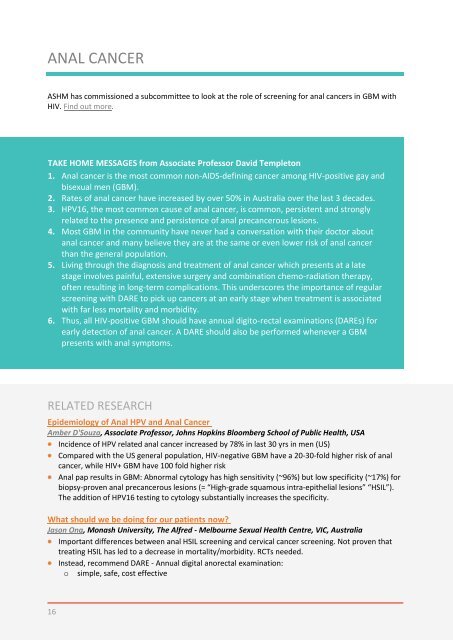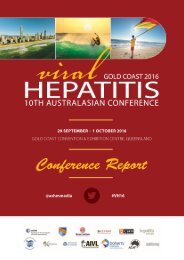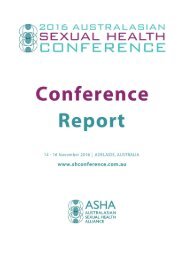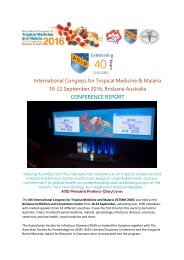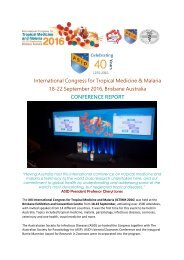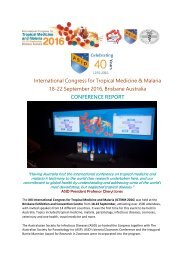AUSTRALASIAN HIV CONF REPORT 2016_FINAL
The Australasian HIV & AIDS Conference, run by ASHM, presents new and innovative research from across the Australasian HIV sector. Delegates include researchers, clinicians, policy makers, community organisations and activists. This 2016 Conference Report provides a collection of key learnings, with links to abstracts and presentations.
The Australasian HIV & AIDS Conference, run by ASHM, presents new and innovative research from across the Australasian HIV sector. Delegates include researchers, clinicians, policy makers, community organisations and activists. This 2016 Conference Report provides a collection of key learnings, with links to abstracts and presentations.
You also want an ePaper? Increase the reach of your titles
YUMPU automatically turns print PDFs into web optimized ePapers that Google loves.
ANAL CANCER<br />
ASHM has commissioned a subcommittee to look at the role of screening for anal cancers in GBM with<br />
<strong>HIV</strong>. Find out more.<br />
TAKE HOME MESSAGES from Associate Professor David Templeton<br />
1. Anal cancer is the most common non-AIDS-defining cancer among <strong>HIV</strong>-positive gay and<br />
bisexual men (GBM).<br />
2. Rates of anal cancer have increased by over 50% in Australia over the last 3 decades.<br />
3. HPV16, the most common cause of anal cancer, is common, persistent and strongly<br />
related to the presence and persistence of anal precancerous lesions.<br />
4. Most GBM in the community have never had a conversation with their doctor about<br />
anal cancer and many believe they are at the same or even lower risk of anal cancer<br />
than the general population.<br />
5. Living through the diagnosis and treatment of anal cancer which presents at a late<br />
stage involves painful, extensive surgery and combination chemo-radiation therapy,<br />
often resulting in long-term complications. This underscores the importance of regular<br />
screening with DARE to pick up cancers at an early stage when treatment is associated<br />
with far less mortality and morbidity.<br />
6. Thus, all <strong>HIV</strong>-positive GBM should have annual digito-rectal examinations (DAREs) for<br />
early detection of anal cancer. A DARE should also be performed whenever a GBM<br />
presents with anal symptoms.<br />
RELATED RESEARCH<br />
Epidemiology of Anal HPV and Anal Cancer<br />
Amber D'Souza, Associate Professor, Johns Hopkins Bloomberg School of Public Health, USA<br />
Incidence of HPV related anal cancer increased by 78% in last 30 yrs in men (US)<br />
Compared with the US general population, <strong>HIV</strong>-negative GBM have a 20-30-fold higher risk of anal<br />
cancer, while <strong>HIV</strong>+ GBM have 100 fold higher risk<br />
Anal pap results in GBM: Abnormal cytology has high sensitivity (~96%) but low specificity (~17%) for<br />
biopsy-proven anal precancerous lesions (= “High-grade squamous intra-epithelial lesions” “HSIL”).<br />
The addition of HPV16 testing to cytology substantially increases the specificity.<br />
What should we be doing for our patients now?<br />
Jason Ong, Monash University, The Alfred - Melbourne Sexual Health Centre, VIC, Australia<br />
Important differences between anal HSIL screening and cervical cancer screening. Not proven that<br />
treating HSIL has led to a decrease in mortality/morbidity. RCTs needed.<br />
Instead, recommend DARE - Annual digital anorectal examination:<br />
o simple, safe, cost effective<br />
16


